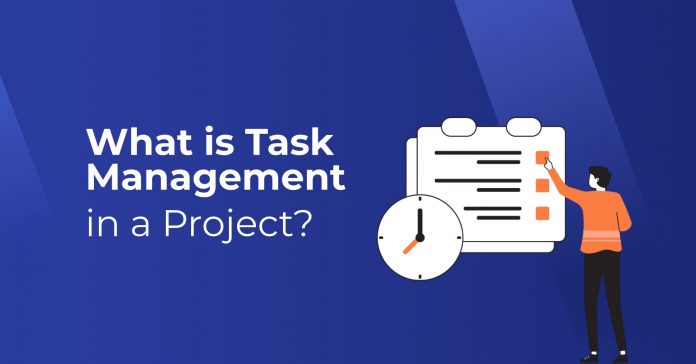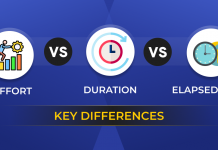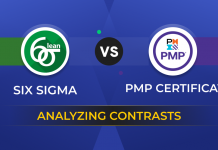
Are you a project manager or an entrepreneur struggling to keep tasks aligned?
Or
A team leader looking to streamline your project’s workflow?
This blog is your ultimate guide to mastering the art of task management in any project setting. We delve into organizing, prioritizing, and executing tasks effectively, ensuring you, as a project manager, stay ahead in the fast-paced business environment.
We cover everything from leveraging cutting-edge tools and techniques that empower you to improve task management to skills that foster seamless team collaboration.
Table of Contents:
- What is Task Management in a Project?
- Project Management vs Task Management
- Benefits of Task Management
- Who is Involved in Project Task Management?
- How to Manage Tasks?
- Common Task Management Challenges
- Key Strategies to Improve Task Management
- Conclusion
What is Task Management in a Project?
Task Management is a fundamental component of project management, involving the prioritization, and execution of tasks to achieve specific objectives within a project. It involves managing a task through its life cycle, encompassing planning, testing, tracking, and reporting. Task management helps teams and individuals to complete their work efficiently and effectively.
“Task management helps in breaking down projects into manageable tasks. Each task is a basic building block of a project, and managing these tasks effectively is crucial for the project’s overall success.“
Effective task management ensures that individual tasks are completed successfully and contributes to the project’s overall health. It enhances productivity, reduces stress, and provides a clear roadmap for project goals.
Project Management vs Task Management
Understanding the distinction between project and task management is crucial for effective organization and execution in any work environment.
Project management encompasses a project’s overall vision and direction, guiding it from inception to completion. Task management, conversely, focuses on the specific details of managing individual tasks that collectively contribute to the project’s success.
Below, we present these differences in a concise tabular format to clarify how each process functions and their respective roles in achieving organizational goals.
| Context | Project Management | Task Management |
| Definition | Leading a project from start to finish, including planning, execution, monitoring, and closing | Managing individual tasks from conception to completion |
| Scope | Broader scope encompassing the entire project | Narrower scope focusing on specific tasks within a project |
| Goal | To achieve the project’s specific objective | To complete the individual task, contributing to the overall project goal |
| Dependencies | Analyzes and manages relationships and dependencies between various project components | Focuses on task-specific dependencies, if any |
| Tools Used | Project management tools like Gantt charts, project timelines, resource allocation charts | Task management tools like to-do lists, Kanban boards, task-specific software |
| Outcome | Successful completion of the project as per objectives, budget, and timeline | Successful completion of individual tasks, contributing to project milestones |
Understanding these differences is key to effectively managing both projects and tasks. While project management provides the strategic framework for achieving project objectives, task management offers the tactical support to execute those strategies, ensuring that each small step contributes effectively to the larger goal.
Benefits of Task Management in Project
Task management is a key for project success. Structured methodologies elevate productivity, streamline workflows, and nurture collaboration. Explore the transformative advantages it brings to enhance your projects.
Improve Productivity
Task management plays a key role in enhancing overall productivity within a project. Teams can optimize their workflow by implementing systematic approaches such as task prioritization and time allocation.
The ability to focus on high-priority tasks first ensures that critical components are addressed promptly, avoiding unnecessary delays.
Additionally, the transparent communication facilitated by task management tools ensures everyone is aligned with project objectives, reducing confusion and enhancing the collective effort toward project completion.
Increase Efficiency
Efficiency in project execution is a natural byproduct of effective task management. Streamlined workflows, facilitated by task management systems, minimize bottlenecks and unnecessary steps, allowing teams to work more effectively.
Collaboration tools integrated into task management platforms encourage real-time communication and decision-making, eliminating the need for prolonged email exchanges or meetings.
Through clear task assignments and defined responsibilities, teams can avoid duplication of efforts and make sure that each team member contributes efficiently to the overall project goals. In essence, task management maximizes output with minimal resources.
Reduce Stress
Task management contributes significantly to stress reduction among team members by providing clarity and structure. Clear expectations and well-defined roles alleviate the anxiety associated with uncertainty. The breakdown of tough projects into manageable tasks prevents team members from feeling overwhelmed.
Knowing exactly what needs to be done and when, individuals can confidently approach their work, resulting in a more positive work environment. Furthermore, task management tools that offer reminders and progress tracking serve as supportive mechanisms to prevent tasks from falling through the cracks and mitigate the stress of missed deadlines.
Ensure Customer Satisfaction
Customer satisfaction is intricately tied to project outcomes’ timely delivery and quality. Task management ensures deadlines are met through effective time management and adherence to project timelines.
By breaking projects into smaller, manageable tasks, teams can monitor and maintain a high-quality standard throughout the process.
This dedication to quality and transparent communication facilitated by task management tools fosters stakeholder trust and satisfaction. Meeting or exceeding customer expectations becomes a more achievable and consistent outcome.
Monitor Trends
Task management systems are essential for organizations, providing a seamless way to assess statistics and analyze operational trends. With these insights, teams can pinpoint effective strategies, address areas needing attention, and optimize overall productivity.
This proactive approach to decision-making empowers businesses to refine processes and stay competitive in a dynamic environment.
Armed with data from task management systems, organizations can develop targeted strategies that align with their goals. Businesses can address challenges and capitalize on strengths by refining operations, reallocating resources, and adopting innovative technologies.
Task management benefits extend beyond data analysis, offering a pathway to continuous improvement and strategic decision-making in today’s competitive landscape.
Who is Involved in Project Task Management?
In project task management, various roles come together to ensure the smooth execution and completion of tasks within a project. Each role contributes unique skills and perspectives, creating a collaborative environment essential for project success.
Here’s a look at the key roles involved in project task management:
- Project Managers: The project manager is key to project task management. They oversee the entire project, ensuring tasks align with its objectives, timeline, and budget. Their responsibilities include planning, organizing, leading, and controlling project activities.
- Team Leaders: Team leaders or supervisors are crucial in managing and motivating team members. They are responsible for delegating tasks, monitoring progress, and ensuring their team meets its deadlines and quality standards.
- Team Members: The individuals who execute the tasks. Team members are often specialists in various fields and bring their expertise to complete assigned tasks. They are responsible for understanding their tasks, collaborating, and completing their work on time.
- Stakeholders: Clients, sponsors, and senior management may not be directly involved in day-to-day task management but play a vital role. They are vested in the project and can influence its direction and priorities.
- Resource Managers: Responsible for allocating resources needed for task completion, such as workforce, tools, and materials. They ensure that teams have what they need to work efficiently.
- Quality Assurance Professionals: They ensure that the tasks and final deliverables meet the required standards and are defects-free. Their role is critical in maintaining the quality of the project’s output.
- IT Support and Technical Experts: IT and technical experts provide the necessary support and expertise for projects involving technical components. They ensure that the technological aspects of tasks are handled efficiently.
Each role contributes to effectively managing project tasks, ensuring the project progresses smoothly towards its goals. Collaboration, communication, and a clear understanding of each role’s responsibilities are vital for successful project task management.
How to Manage Tasks?
Managing tasks effectively is crucial for the success of any project. The PMI’s Global Project Management survey highlights the importance of clearly defined objectives and disciplined strategy implementation.
Here’s how you as a project manager, can excel in task management, keeping these insights in mind:
- Prioritization: Begin by prioritizing your project tasks. Use a to-do list or a comprehensive project task management tool to identify the most critical tasks. This step ensures you focus on what’s essential, preventing resource wastage and time mismanagement. Ask yourself, “Which tasks have the highest impact on project success?”
- Milestone Tracking: Set and track milestones. This doesn’t just provide a roadmap but also keeps the team motivated and focused. Milestones act as checkpoints to measure progress and realign efforts as needed. Regularly review these milestones: Are you on track, or do adjustments need to be made?
- Schedule Management: Assign realistic timeframes to each task based on the estimated effort required. Efficient schedule management is key to ensuring tasks are completed on time, contributing to the project’s overall health. Use tools like Gantt charts for visual scheduling and tracking.
- Resource Allocation: Allocate resources optimally. Match tasks with the right talent and resources, considering your budget and schedule constraints. Efficient resource allocation maximizes productivity and minimizes waste.
- Collaboration: Foster a collaborative environment. Use task management software to keep team members connected and in sync. Regular team meetings and updates are crucial. Encourage open communication: Are team members facing any hurdles? How can these be overcome collaboratively?
- Deadline or Priority Matrix: Implement a deadline or priority matrix, categorizing tasks based on urgency and importance. This visual approach helps quickly identify tasks that need immediate attention versus those that can be scheduled for later.
Effective task management is more than just completing tasks; it’s about doing the right tasks at the right time with optimal resources. Following these steps can enhance your project’s performance, leading to successful outcomes.
Common Task Management Challenges
Effective task management is pivotal for the success of any project, but it often comes with challenges. By understanding these challenges and implementing strategic solutions, project teams can navigate difficulties and ensure project success.
Let’s explore some common project task management challenges and how to overcome them, using examples for better understanding.
1. Unclear Task Requirements
-
- Challenge: A common issue is the need for clear task requirements, leading to confusion and delays. For instance, a software development team might struggle if the client’s requirements are vague or constantly changing.
- Solution: Establish a clear communication channel with stakeholders. Regularly review and update task requirements and ensure everyone involved understands the changes. Implementing an iterative approach, like Agile methodology, can be beneficial in such scenarios.
2. Overlapping Deadlines and Resource Constraints
- Challenge: Managing tasks with overlapping deadlines, especially with limited resources, is a significant hurdle. Imagine a marketing team facing multiple campaign deadlines simultaneously but with limited personnel.
- Solution: Prioritize tasks based on urgency and impact. Use tools like Gantt charts to visualize overlapping deadlines and adjust resources accordingly. Consider outsourcing or reallocating resources from less critical tasks.
3. Ineffective Team Collaboration
- Challenge: Teams that need help with collaboration often need more time to communicate effectively. An example is a remote team failing to synchronize due to time zone differences.
- Solution: Implement collaboration tools that accommodate different time zones. Schedule regular check-ins and encourage open communication. Establish clear roles and responsibilities to streamline collaboration.
4. Adapting to Unforeseen Circumstances
- Challenge: Unexpected events, like a key team member falling ill, can derail task progress. For example, an event planning team might face a crisis if a major supplier backs out at the last minute.
- Solution: Have contingency plans in place. Cross-train team members so they can cover for each other. Build relationships with multiple suppliers to mitigate risks.
5. Difficulty in Tracking Progress
- Challenge: Proper tracking mechanisms make it easier to maintain task progress. Consider a scenario where a construction project needs to catch up due to inadequate progress tracking.
- Solution: Use project management software to track task progress in real-time. Regularly review progress with the team and adjust plans as necessary.
You can significantly improve project task management by acknowledging and addressing these challenges head-on. Each challenge presents an opportunity for growth and learning, paving the way for more successful project outcomes.
Key Strategies for Effective Task Management
Effective task management is the cornerstone of successful project execution. It involves more than just listing and assigning tasks; it requires a strategic approach combining technology, communication, and flexibility.
Here are key strategies to elevate your task management in the project process:
Technology Utilization
Embrace the power of task management software. The right tool can streamline task delegation, progress tracking, and team collaboration. Choose software that offers flexibility and customization to meet your specific project needs. This not only saves time but also enhances overall efficiency and productivity.
Agile Methodologies
Agile frameworks like Scrum can be adapted for various projects, not just software development. These methodologies enhance flexibility and responsiveness, allowing teams to adapt to changes and new requirements quickly.
Team Autonomy
Empower team members by giving them ownership of their tasks. This fosters a sense of responsibility and encourages innovative problem-solving. Autonomy increases job satisfaction and motivates team members to perform at their best.
Balanced Workloads
Regularly monitor and balance team workloads to prevent burnout and ensure optimal productivity. Balanced workloads also create a more positive work environment and better team morale.
Training and Development
Invest in regular training and development sessions for your team. Enhancing skills and knowledge not only improves task execution but also keeps the team updated with the latest trends and technologies. We at Invensis Learning provide various training and development courses that help your teams upskill in the present trends.
Incorporating these strategies into your task management approach can foster a more efficient, collaborative, and adaptive project environment. This not only leads to the successful completion of individual tasks but also contributes significantly to the overall success of your projects.
Conclusion
Task management is an indispensable part of project management, intertwining strategy, clarity, and effective execution. This blog has highlighted the significance of clear communication, adept use of technology, and the pivotal role of teamwork and adaptability.
Effective task management goes beyond just completing tasks; it’s about aligning them with the project, ensuring every action contributes meaningfully to the final objective.
For those eager to delve deeper and master the art of task management, our Project Management courses offer a wealth of knowledge and practical skills.
These courses are tailored to equip you with a comprehensive understanding of task and project management, enhancing your ability to lead and succeed in any project environment. Enroll now to elevate your skills and navigate the complexities of project management with confidence and proficiency.

















